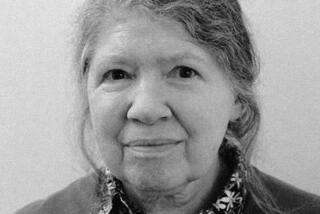Victorian freedom in a corset
- Share via
Hello to the Cannibals
A Novel
Richard Bausch
HarperCollins: 662 pp., $27.95
*
Toward the end of Richard Bausch’s novel “Hello to the Cannibals,” heroine Lily Austin meets Violet Beaumont, a crotchety nonagenarian straight from central casting, who “rambles on about the old days,” nods off in a rocker and offers up crusty bits of wisdom to 22-year-old Lily and her gay best friend Dom. Violet shares Lily’s near-obsessive interest in Mary Kingsley, a late-19th century explorer and travel writer who thrilled the readers of that time with tales of her adventures in Africa.
Though Lily has spent much of the novel researching and writing a play about Kingsley, Violet better understands the harsh realities of Kingsley’s life as it was actually lived, the life of a defiantly single woman in Victorian England, a woman who felt more at home climbing Mt. Cameroon in corset and petticoat than serving tea in a drawing room. “Mary Kingsley was an outlaw,” Violet tells Lily, “An outlaw in bombazine and lace.”
And, besides being an outlaw, Kingsley is an inspiration to Lily, whose own life has turned out to be disappointingly empty. “Hello to the Cannibals” is a big, sprawling sort of book that connects two centuries through the lives of these two women, Kingsley and Lily. Fearful and timid, Lily isn’t quite sure how to navigate between the banalities and freedoms of life in modern America; thus, she seeks solace in Kingsley, not only writing a play about her but also striking up a “friendship” with this lady from another time by writing letters to her. These are interspersed throughout the novel.
We first meet Lily in 1982, on her 14th birthday, when a friend gives her a book about explorers, which includes a section on Kingsley that immediately enthralls her. Later that evening, her friend’s grandfather makes a rather aggressive pass at her, causing Lily to withdraw into herself, “troubled by the company of strangers.” Six years later, we meet Lily again, as a senior in college. Her parents have divorced and her father’s remarried to a woman Lily’s age. Although Lily’s the star of the drama department, she has only two friends: Sheri Galatierre, a Mississippi good-time girl, and Dom, who has not yet realized that he’s gay and who harbors feelings for Lily.
But Lily has fallen in love -- literally at first sight -- with Tyler Harrison, Sheri’s enigmatic half brother. The couple marry hastily and move to Oxford, Miss., where Tyler has a job waiting at his stepfather’s Oldsmobile dealership. For a time, all is good. Then, Lily discovers she’s pregnant, and Tyler turns cold and distant, for surprising reasons.
All the while, Lily writes her letters to Kingsley -- “I admire your bravery because I sense how prodigious your fear was” -- and works on her play. We know this because Bausch tells us so, but he never gives us a chance to have a sense of Lily as a writer or to see her writing or wrestling with her material, (the play itself reads like something from an undergrad playwriting workshop). Instead, as Lily immerses herself in Kingsley’s life, Bausch shows us scenes from it (also starting in her 14th year), substantially fictionalized, though Kingsley was someone whose life perhaps didn’t need much embellishment.
Kingsley spent much of her brief life dutifully tending to her invalid mother and dying father. At 30, a small inheritance allowed her to fulfill her dream of exploring remote regions of West Africa, battling alligators, befriending cannibals and generally going where no white man had gone. Her first book, “Travels in West Africa,” was an immediate bestseller, “The Perfect Storm” of its day. She returned to West Africa a second time, produced a second book, spoke out against missionary activities, advised Britain’s colonial secretary on governing the region, and, in 1900, traveled to South Africa to nurse casualties of the Boer War. In Simonstown, she contracted typhus and died, asking that her body be tossed in the sea. She was 37.
Bausch, unfortunately, captures little of Kingsley’s humor and chutzpah -- instead we get a nervous, neurotic Kingsley who doubts herself at every junction. Yet he still makes her fascinating, and all the more so in contrast to Lily, who remains something of a blank, a non-character. Kingsley, of course, gets to do things -- to talk with ship captains, climb mountains, meet cannibals -- while Lily sits around, eating soup and wishing everyone would be nicer to each other.
And therein lies the novel’s central irony: Lily has the freedom to do whatever she pleases but is paralyzed by fear, awed by the chaos of human relationships; Kingsley found freedom in a world that didn’t offer it, eschewing the trappings of Victorian life and venturing out into the wild, untamed world. In the end Lily, left alone with her baby after Tyler abandons her, makes a step toward love in an unlikely place and, in doing so, moves a smidgen toward confronting her own demons, toward knowing herself.
“Were you so terrified of intimacy?” Lily asks Kingsley in one of her early letters. “Did you have this same expectation, all the time, that things were not going to work out? That something bad was just on the other side of every minute?” The answer, of course, is a resounding no. Kingsley feared nothing and bravely shaped her own destiny.
The most fierce cannibals, Bausch suggests, are those within us, those who eat us from the inside out, who disallow us from seeing the inevitability of our own Africas. It’s a powerful sentiment -- and one that carries the heavy weight of truth -- but one wishes Bausch had allowed his heroine to be less than a mere vessel for such thudding epiphanies, or to simply be less of a heroine and more of a character, someone who might show her cannibals to the reader, even if she can’t yet greet them herself.
More to Read
Sign up for our Book Club newsletter
Get the latest news, events and more from the Los Angeles Times Book Club, and help us get L.A. reading and talking.
You may occasionally receive promotional content from the Los Angeles Times.









